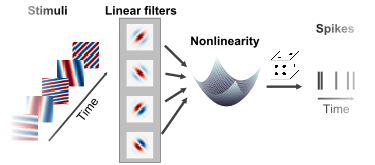Neural coding of complex sensory stimuli

Sensory perception involves not only extraction of information about the physical world from the responses of various sensory receptors (e.g., photoreceptors in the retina and mechanoreceptors in the cochlea), but also the transformation of this information into neural representations that are useful for cognition and behavior. I am leveraging techniques from statistics and machine learning to understand the nature of stimulus-response transformations at various stages of sensory processing, and the ways in which the resulting neural representations relate to perception. A specific focus is on the coding of complex auditory and visual inputs and the effects of behavior and arousal or attention on stimulus-response relationships.
Collaborators
- Jennifer Linden (UCL Ear Institute, London)
- Maneesh Sahani (Gatsby Unit, London)
- Bernhard Englitz (Donders Institute, Nijmegen)
Relevant publications
Models of neuronal stimulus-response functions: elaboration, estimation and evaluation
Meyer AF, Williamson R, Linden JF, and Sahani M
Front. Syst. Neurosci., 2017, 10, 109
(article)
Score-Matching Estimators For Continuous-Time Point-Process Regression Models
Sahani M, Bohner G, Meyer AF
In: 2016 IEEE 26th International Workshop on Machine Learning for Signal Processing (MLSP), 2016
(article)
Fast and robust estimation of spectro-temporal receptive fields using stochastic approximations
Meyer AF#, Diepenbrock JP, Ohl FW, and Anemüller J
J Neurosci Methods, 2015, 246, 119-133
(article)
Temporal variability of spectro-temporal receptive fields in the anesthetized auditory cortex
Meyer AF#, Diepenbrock JP, Ohl FW, and Anemüller J
Frontiers in Computational Neuroscience, 2014, Vol. 8(165) (article)
Discriminative Learning of Receptive Fields from Responses to Non-Gaussian Stimulus Ensembles
Meyer AF#, Diepenbrock JP, Happel MF, Ohl FW, and Anemüller J
PLOS ONE, 2014, Vol. 9(4), pp. e93062
(article)
Quantifying neural coding noise in linear threshold models
Meyer AF#, Diepenbrock JP, Ohl FW, and Anemüller J
In: Proceedings of the 6th International IEEE/EMBS Conference on Neural Engineering, NER 2013, San Diego
(article)
Do we need STRFs for Cocktail Parties? - On the relevance of physiologically motivated features for human speech perception derived from automatic speech recognition (ASR)
Kollmeier B., Schaedler MR, Meyer AF, Anemüller J, Meyer, BT
Adv Exp Med Biol. 2013;787:333-41
(article)
Automatic classification of audio using nonlinear neural response models
Bach* JH, Meyer* AF, McElfresh D, and Anemüller J
In: 2012 IEEE International Conference on Acoustics, Speech and Signal Processing, 2012.
(article)